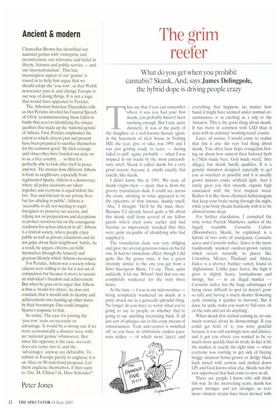The grim reefer
What do you get when you prohibit cannabis? Skunk. And, says James Delingpole, the hybrid dope is driving people crazy T. hey say that if you can remember where it was you had your first skunk, you probably haven't been smoking enough. But I can, quite distinctly. It was at the party of the daughter of a well-known literary agent, in the basement of their house in Notting Hill; the year, give or take, was 1991 and I was just getting ready to leave — having failed to pull again, probably — when I was stopped in my tracks by the most extraordinary smell. Skunk is called skunk for a very good reason: because it, smells exactly, but exactly, like skunk.
I didn't know this in 1991. We were all skunk virgins then — apart, that is, from the groovy trustafarian dude I could see across the room, smoking in what appeared to he the epicentre of that intense, skunky smell. 'Alla,' I thought. 'He'll be the man, then.' Because I'd already heard quite a bit about this skunk stuff from several of my fellow guests who'd tried some earlier and had become so impressively wrecked that they were quite incapable of identifying who had supplied it.
The trustafarian dude was very obliging and gave me several generous tokes on his fat one. It had no immediate effect, though I did quite like the grassy taste: it has a green intensity similar to the one you get from a Kiwi Sauvignon Blanc, I'd say. Then, quite suddenly, it hit me. Wham! And that was me completely wankerecl for the next three hours.
At the time — I was in my mid-twenties — being completely wankered on skunk at a party struck me as a generally splendid thing. No longer do you have to worry what you're going to say to people or whether they're going to say anything interesting back. ft all just sort of splurges out in this crazy stream of consciousness. Your auto-censor is switched off, so you have no inhibitions (unless paranoia strikes — of which more later); and everything that happens, no matter how banal it might have seemed under normal circumstances, is as exciting as a trip to the Amazon. This is the good thing about skunk. It has more in common with LSD than it does with its ordinary working weed' cousin.
Later, of course, I would come to realise that this is also the very bad thing about skunk. You often hear dope evangelists boring on about how natural their beloved herb is (Nan made beer, God made weed,' they allege), but skunk hardly qualifies. It is a genetic mutation designed especially to get you as wrecked as possible and it is usually grown indoors under artificial light. And it rarely gives you that smooth, organic high associated with the best tropical weed. Rather it is like those chemical hallucinogens that keep your brain racing through the night, while your body pleads fruitlessly with it to be allowed some sleep.
For further elucidation, I consulted the wine writer Patrick Matthews, author of the hugely readable Cannabis Culture (Bloomsbury). Skunk, he explained, is a hybrid of two sorts of marijuana: Cannabis saliva and Cannabis indica. Saliva is the more traditionally smoked outdoor-grown variety which occurs naturally in places like Colombia, Mexico, Thailand and Africa; Indica is a shorter, bushier variety found in Afghanistan. Unlike pure Saliva, the high it gives is slightly heavy, lassitudinous and
mongy, but — in an illegal market Cannabis indica has the huge advantages of being more difficult to spot (it doesn't grow so tall) and having a much shorter flowering cycle (making it quicker to harvest). But it does, he adds, make you want to 'fall over, sit on the sofa and not do anything'.
When skunk first started coming in, no one much worried about its shortcomings. If you could get hold of it, you were grateful because it was still excitingly new and elusive; and it got you where you wanted to be so much more quickly than its rivals. In fact it hit the market at exactly the right time — when everyone was starting to get sick of buying twiggy amateur home-grown or dodgy black hash mixed with earwax and melted down LPs and God knows what else, Skunk was the new superweed that had come to save us all.
There are people I know who still think this way. In the intervening years, skunk has grown stronger and yet stronger, as ever more virulent strains have been devised with names such as White Widow, Dutchman's Orange, Purple Haze, Northern Lights and Guerrilla's Gusto. I have friends who treat their weed rather as you might cocaine — something to get you completely out of it, rather than something to make you feel merely light-headed and mellow.
Me, I really can't be doing with that any more. I can't bear the hangover the next day (it is booze that is supposed to give you hangovers, not dope) and I can't bear the teethgrinding paranoia it induces at the time, or the agonised self-analysis that comes afterwards. It turns people into gibbering control freaks and sends them racing into their own private trips. There's little sense that you're all in it together. Everyone disappears down their own blind alley.
At first I assumed that this was because I was becoming a lightweight with old age, but, asking around, I've discovered that a lot of people feel the same way — even connoisseurs like David Crane of the cannabis campaign organisation The Hempire. 'I never smoke it if I can help it. It interferes too much with regular life,' he says. Unfortunately, these days skunk is virtually the only form of marijuana you can buy. Because it is so quick and easy to produce indoors under grow lamps, it has driven most imported weed (save pernicious soap-bar hash) out of the marketplace. This is not dissimilar to what happened in America during Prohibition, when beer virtually disappeared and hard liquor was king: the potential profits were greater, the risks (because near-neat alcohol is less bulky and therefore easy to smuggle) smaller. Once Prohibition was lifted, alcohol consumption by volume increased massively. But the more significant statistic is that at the same time incidence of cirrhosis of the liver fell.
And there are lessons here to be learnt about cannabis prohibition. The government's attempts to stop cannabis consumption have, it goes without saying, proved a total failure. Rather, they have actually managed to make matters worse by helping to drive the mildly intoxicating forms of the drug from the market and replacing them with a superstrength version 20 times more powerful than the one pot-heads smoked in the Sixties.
Last year, Channel 4 ran a documentary — Cannabis Psychosis — about the research of Zerrin Atakan, a consultant psychiatrist at Lambeth Hospital, into the increase in schizophrenia caused, she believed, by heavy cannabis use. At the time I thought this was just another anti-drugs scare story by the medical establishment. But since then I've spoken to so many people whose friends or kid brothers have experienced problems ranging from mild psychosis to complete breakdowns as a result of smoking too much skunk weed, I believe it constitutes a really quite serious social threat. Under-age teenagers are especially vulnerable. For them, dope is easier to get hold of than alcohol. And they are quickly learning to consume — in quantities that would floor most users from my generation — the marijuana equivalent of the Special Brew lager so loved by alcoholics and down-and-outs.
It is no coincidence that the Californian who helped invent skunk has now renounced his Frankenstein monster and is concentrating on new strains of Cannabis saliva: nor that in Amsterdam coffee shops and seed merchants, 'heads' have begun to turn their backs on Indira hybrids in favour of pure Cannabis sativa stock. Not without reason, the world has begun to realise, does skunk stink.



































































































 Previous page
Previous page